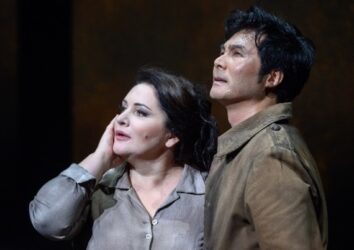 United Kingdom Verdi, Il trovatore: Chorus and Orchestra of the Gran Teatre del Liceu / Riccardo Frizza (conductor). Gran Teatre del Liceu, Barcelona, 27 and 28.10.2022. (JMI)
United Kingdom Verdi, Il trovatore: Chorus and Orchestra of the Gran Teatre del Liceu / Riccardo Frizza (conductor). Gran Teatre del Liceu, Barcelona, 27 and 28.10.2022. (JMI)

Production:
Director – Alex Ollé
Sets – Alfons Flores
Costumes – Lluc Castells
Cast:
Manrico – Vittorio Grigolo / Yonghoon Lee
Leonora – Saioa Hernández / Hibla Gerzmava
Azucena – Ksenia Dudnikova / Judit Kutasi
Count Luna – Juan Jesús Rodríguez / Ángel Ódena
Ferrando – Gianluca Buratto / Krzysztof Baczyk
Inés – María Zapata
Ruiz – Antoni Lliteres
Only five years have passed since Il trovatore was last performed at the Liceu, and things did not start smoothly due to the always-feared illnesses. Indeed, the director of the Liceu came on stage to comment that Saioa Hernández had been ill in recent days, and her presence had been in doubt until the last moment, although she had finally decided to sing. All of this weighed on the performance.
The staging by Alex Ollé is a co-production of the Opéra national de Paris and the Dutch National Opera. It premiered seven years ago in Amsterdam, and I had the opportunity to see it the following year at the Opéra Bastille. Then, as now, the production was disappointing. The action takes place in a warlike environment during the past century, where Count Luna’s troops seem to be those of a regular army while Manrico’s respond more to the concept of guerrilla forces.

The sets and costumes are of little interest. This stage is almost bare, and that has an impact on the voices which do not reach the audience with the necessary clarity.
The musical direction was entrusted to Riccardo Frizza, who conducted Les contes d’Hoffmann at the Liceu last season with good results. His reading here was correct and supported the singers although, in my opinion, there was a lack of emotion. Undoubtedly, the fact of having a sick Leonora influenced his direction, which had to be more delicate when the soprano was on stage. The Liceu orchestra did well, as did the chorus, where the women seemed to me better than the men.
Manrico was sung by tenor Vittorio Grigolo, who was making his debut in the role. He is a skillful actor and sang in a very natural way. I found him more involved in this character than on previous occasions, where his playing was usually exaggerated. He was good in the long-awaited Act III aria and brilliant in the famous ‘Di quella pira’, although he only sang one verse (and I think it was off key). Tenor Yonghoon Lee was Manrico in the second cast. His voice is powerful and nicely suited to the role – he is a guarantee in this type of character.
Leonora was sung by soprano Saioa Hernández, one of the main attractions in the cast. As I mentioned above, there was mention of her being ill, and the truth is that she took numerous precautions throughout the entire opera. At times her voice did not reach out into the opera house clearly, although normally her voice is quite remarkable in terms of volume. I don’t know if, in these circumstances, it might have been better to cancel.
Soprano Hibla Gerzmava as Leonora in the second cast gave a performance that was clearly an improvement upon that of Saioa Hernández. We had a chance to see her in this part three years ago at the Teatro Real, and she once again sang with gusto, demonstrating her attractive voice throughout the tessitura. Her top register is somewhat metallic, but she was an impressive Leonora, especially in her Act III aria.
Azucena the gypsy was sung by mezzo-soprano Ksenia Dudnikova. She has a wide voice that is appropriate to the demands of the character, although her voice does lose quality at the top. The second Azucena was mezzo-soprano Judit Kutasssi, who was returning to the Liceu where she was an excellent Amneris in Aida two years ago. On this occasion, she was again superb, with a voice that is stronger at the top that that of her colleague in the first cast.
Juan Jesús Rodríguez was quite good as Count Luna, with an important voice that is very well-suited for Verdi’s baritones. He was outstanding in the ‘Il balen del suo sorriso’ aria. Ángel Ódena in the second cast has a powerful voice, although he has the common problem of singing everything forte, as if someone had told him that otherwise he would not be heard.
Bass Gianluca Buratto was correct in the role of Ferrando. In his Act I aria, his voice wasn’t heard through the orchestra very clearly, a result of the open stage. In the second cast Ferrando was played by Krzystof Baczyk, who also had some problems with projection on that stage.
The secondary characters were nicely covered by María Zapata in the part of Inés and by Antoni Lliteres as Ruiz.
Jose M. Irurzun
